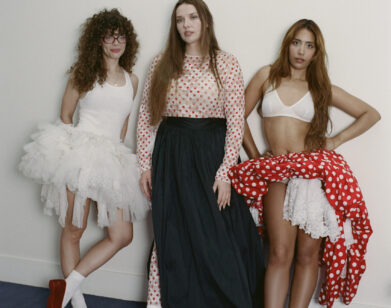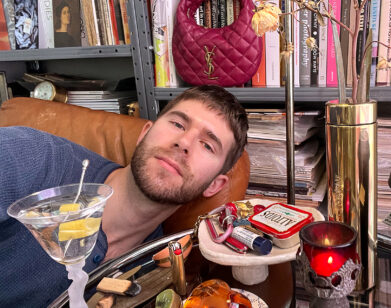The Fendi Family Recharges Rome

LOOK 22 BY MARCO DE VINCENZO
Italian fashion is having an identity crisis and in that typical “empty the ashtray when the house is burning down” way. To start, there has been a lot of noise about the length of Milan’s Fashion Week. As the number of Milan’s allotted days continues to shrink, Rome, the historical home of Italian Haute Couture, has opened its internationally overlooked fashion week to young designers, notably with Italian Vogue’s “Who Is On Next” talent contest.
One of the funniest side shows of is the uproar over Anna Wintour’s “shortened” visit to Milan this season, and the subsequent last-minute scramble to reschedule shows to accommodate “Anna’s days.” The Italians are crying mama mia about the decrease in sales figures too, estimated as the biggest fall in twenty years (down 15% from last year, according to Italy’s Camera della Moda).
Behind this crisis is a revaluation of fashion in the minds of consumers. The stiletto-and-cashmere crowd is asking, “What exactly am I getting out of all this?” Besides being beautiful, fashion needs a kick, a punchline, a whiff of scandal or a private joke, or just simple newness (one of those obnoxious adjectives dreamed up in New York’s Garment District).
This makes the recent haute couture week in Rome so interesting. The mix of young designers and classic Italian couture houses catering to loyal, local, insider clientele has a Fellini-esque quality; two radically different groups, one incredibly old school, the other intrepidly new school, are rubbing elbows for a common cause. It’s certainly not on her schedule yet, but I wouldn’t be too surprised if Anna Wintour turned up in Rome for a peak. For one thing, Rome is a lot more fun than industrial Milan.
Two of the brightest stars in Rome right now are in the Fendi orbit. The luxury accessories, leather, and fur house started in 1925 as a small leather shop in Rome. 85 years later, Fendi’s second generation, the five Fendi sisters, have a constellation of children and grandchildren, many of whome have branched out creatively. LEFT: TETRIS BAG BY CARMINA CAMPUS
Carmina Campus is the Rome-based eco brand of Ilaria Venturini Fendi, with its own store RE(f)USE on via Fontanella Borghese, a little street near the Spanish steps where all the city’s luxury brand stores are clustered. Carmina Campus produces its bags and other accessories using industrial scraps—car seat covers, sun visors, and safety belts from junk cars for its Carbag collection. The results are bright, clever and exciting, and quite a contrast from the usual dowdy, mud-colored eco fare. Fendi worked on the accessories for the family brand before she left to start an organic farm outside Rome. This season in Rome Carmina Campus presented “A Tour Through Dumpsters,” its project with the ITC (International Trade Center, a UN agency which promotes trade in developing countries). Fendi’s ongoing mission is to work with slum dwellers in Kenya and Uganda whose sole income typically comes form sorting garbage at dump sites. Fendi will help find recyclable materials, develop design ideas based on local handcraft traditions, and jump start manufacturing.
Finally, Italy is turning its attention to young designers. The country with the most sophisticated production capability (the finest materials and the most innovative ateliers) has been surprisingly unsupportive of its emerging talent—until now. Young Sicilian designer Marco de Vincenzo is based in Rome, where he works as the first assistant of Silvia Venturini Fendi on accessories. And it was in Rome where he won 2009s Who Is On Next prize, awarded by Italian Vogue to highlight new talent. Vincenzo likes to take fabric apart, slice it, and stitch it back together to create a new material. For fall (his second season), presented last Sunday in Milan, Vincenzo tucked and spliced fabrics for a triangular kind of patchwork in tops, skirts and dresses. He also styled evening parkas like casual down jackets and used dark landscape prints for dresses, tunics and coats. These are the first steps for a potentially major talent.






